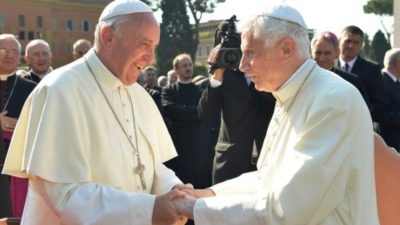– José Maria C.S André
The authors are Pope Francis and Benedict XVI. The title: Do not harm any of these little ones. Peter’s voice against pedophilia. The Italian publisher Cantagalli announced translations in Spanish, German, English, Albanian and this week the Portuguese translation was also released.
Although the incidence of pedophilia varies greatly between countries and dioceses, it is a serious problem in the Church because it undermines fundamental principles. The number of cases among the clergy is scarce compared to society’s average. Nevertheless, the crime of one who should bear a Christian testimony is more serious and the situation is even sadder when someone infiltrated the seminary with the intention of satisfying these tendencies. Only a tremendous contempt for God could make these behaviors tolerated in some dioceses. More than an occasional weakness, the spread of pedophilia denotes a collective abandonment of God, with a radical inversion of the Christian message. In some particularly degenerate place, there was even a concentration in the seminary of young men attracted to vice rather than called by a vocation to holiness.
One of the most profound analyzes of this total subversion of the priesthood, which replaces God with sin, is the contribution published by Benedict XVI in the April issue of the German magazine Klerusblatt. It was written when Pope Francis called to Rome the presidents of all the episcopal conferences of the world, in February 2019, to reflect on the crisis of faith and of the Church manifest in the scandalous abuse of minors. Benedict XVI begins the article by saying that he contacted the Holy Father before publishing it, but several newspapers described the text as a statement of opposition, certainly because they did not read this initial explanation. But also because they have not read the article to the end: “At the end of my reflections, I want to thank Pope Francis for all he does to continually show us the light of God, which has not yet gone pale. Thank you, Holy Father!” Of course, Francis did not feel attacked, and the first chapter of the book he has just published in partnership with Benedict XVI is that article.
It is surprising that most of the media deal with non-existent attacks and pay attention to irrelevant news, such as the lift that kept Pope Francis for several minutes when he was heading for an audience, while they ignore the first book written in authorship by an acting Pope (Francis) and the former Pope (Benedict XVI). This neglect is not specific of one country: the English, French, German, Spanish, Portuguese press silenced the book… They did not bother to disagree, they simply ignored it. On the contrary, the book is interesting and the introduction, written by Federico Lombardi, SJ, spokesman for Benedict XVI and after for Francis, adds even more to it.
A few days ago, after the Italian version of the book was released, Benedict XVI observed that the word “God” does not appear a single time in the generality of the criticisms made to him. “The fact that it … ignored the central point of my argument, as well as the generality of the reactions of which I am aware, makes clear the gravity of a situation in which the word ‘God’ often seems to be set aside by theology” (Benedict XVI’s reply entitled “68 und der Missbrauch: Antwort auf Birgit Aschmann” –68 and the Abuses: Reply to Birgit Aschmann–, published in September’s 2019 issue of Herder Korrespondenz).
The statistics point to a pattern that may suggest a certain inclination to commit abuse – for example, the abusers are men and victims are mainly boys – but the book does not address this issue. The point on which both authors insist is that whoever does not observe the doctrine of the Church on this point should not be admitted to seminary. For example, the third chapter of the book, which is Pope Francis’ concluding discourse addressed to the Presidents of the episcopal conferences from all over the world, gathered in Rome to deal with pedophilia, is clear: the selection of the candidates for priesthood should be “concerned above all with excluding problematic personalities, … providing a balanced process of formation for suitable candidates, fostering holiness and the virtue of chastity. Saint Paul VI, in his encyclical Sacerdotalis cælibatus 64, wrote that ‘the life of the celibate priest, which engages the whole man so totally and so sensitively, excludes those of insufficient physical, psychic and moral qualifications. Nor should anyone pretend that grace supplies for the defects of nature in such a man.’”


 Follow
Follow


